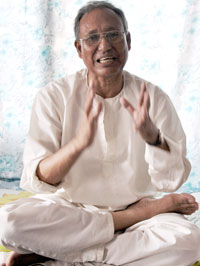Nepal’s dalits step up fight for constitutional rights
by - 1st October 2010
 Kathmandu, September 27 (Lapido) – Nepal’s five million Dalits are pinning their hopes of an end to discrimination on a new Constitution being introduced next year to replace the country’s 240-year old Hindu monarchy with a democracy.
Kathmandu, September 27 (Lapido) – Nepal’s five million Dalits are pinning their hopes of an end to discrimination on a new Constitution being introduced next year to replace the country’s 240-year old Hindu monarchy with a democracy.
Considered ‘untouchable’ or ‘contagiously impure’ in hierarchical Hindu societies, Dalits have remained the poorest of the poor for over two millennia in Nepal.
With the help of human rights groups and activists, the Dalits are fighting back, calling for an end to their inhuman treatment and for their rights to be enshrined in the new Constitution which comes into effect next year.
Man Bahadur Bishwakarma, 61, who was raised in west Nepal, told Lapido how he was made to realise he was ‘impure’ at the age of 13.
‘A “higher caste” resident beat me with sandals for possessing, and thereby “defiling”, the Gita [a Hindu scripture],’ he said. The Gita belonged to Mr Bishwakarma’s father who served in the Gurkha regiment of the British Indian Army.
‘Though an illiterate, he was keeping the book in the house, hidden in a cupboard. I found it after his death.’
Today, Mr Bishwakarma, one of the most prominent Dalit politicians in Nepal, is heading the campaign to underwrite new constitutional rights for the country’s ‘untouchables’ – who number a fifth of the population.
Until recently, he was the sole Dalit member in the Central Working Committee of Nepal’s oldest party, the Nepali Congress.
Another Dalit man recalled the discriminatory treatment he faced early in his life.
‘My school would hold a function on the king’s birthday each year, but Dalit students would be made to sit separately,’ said Ram Nepali, who studied in the Gorkha district in west Nepal.
Today, Mr Nepali is a Dalit activist.
Nepal was the world’s only Hindu kingdom until the fall of the monarchy in December 2007. However, as Pushkar Khati, from the Dalit NGO Federation of Nepal, explained, Dalits continue to suffer. They cannot rent a house – even in the capital, Kathmandu – unless they conceal their caste. In rural Nepal, Dalits cannot sit together at the same table with ‘higher castes’.
Human rights groups say a majority of the thousands of bonded labourers and trafficked sex workers are Dalit.
Mr Nepali added, ‘What hurts the most is that discrimination is based on scriptures.’ He quotes The Manusmriti, one of the earliest Hindu scriptures, which says the Shudras (labourers) are of low origin and cannot own goods or property.
Mr Khati affirmed that the caste system was still being promoted using religion. As part of an annual ritual in Nepal’s biggest temple, Pashupatinath, in Kathmandu, the idol of a god is taken to the houses in the neighbourhood, including a Dalit hamlet, Ambedkar Basti.
However, when the idol is brought back to the temple for re-installation, the priests publicly scold the god for entering into the houses of Dalits.
Politician Mr Bishwakarma is ‘hopeful’ that Dalits will get their rightful place in society with the advent of democracy.
Currently, 45 percent of all seats in politics and government jobs are reserved for marginalised communities, of which 15 percent are for Dalits.
‘This is not sufficient. Dalits want proportional reservation,’ Mr Khati asserted, explaining that many Dalits hid their origin for the 2001 Census out of fear. ‘In the next Census in 2011, Dalits will surely be over 20 percent.’
- Log in to post comments
